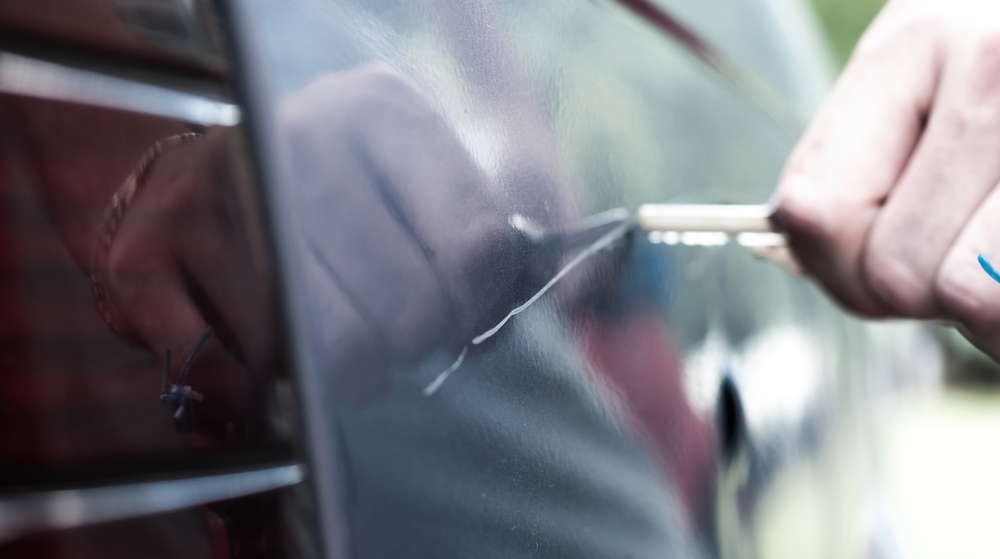
Picture this scenario: you or someone you know is accused of keying a car in NJ. It might sound like a minor, spur-of-the-moment act, but under New Jersey law, it’s treated as a serious offense called criminal mischief. Whether it was an impulsive decision or a misunderstanding, the legal repercussions can be significant and long-lasting. The damage to someone’s vehicle can quickly escalate from a scuffed paint job to a tarnished criminal record.
This blog post takes a firm look at what criminal mischief really means, the penalties associated with keying a car in New Jersey, and why retaining an experienced criminal defense attorney is not merely advisable—it’s necessary.
Understanding Criminal Mischief in New Jersey
Under New Jersey law, criminal mischief is defined as purposely or knowingly damaging someone else’s property. You might assume the term “criminal mischief” only covers major acts of vandalism, but in reality, it can range from breaking a window to tampering with another’s property—and yes, that includes keying a car. This offense is taken quite seriously because it involves the intentional destruction or defacement of someone else’s belongings. Even if you believe the damage is small, or that the owner “won’t mind,” the legal system in New Jersey sees it differently.
According to N.J.S.A. 2C:17-3a(1), criminal mischief offenses can result in various degrees of charges. The nature of the charge—disorderly persons offense or indictable offense—depends on factors like the amount of damage, whether the act created a risk of bodily injury, and whether it involved a public utility or transportation vehicle. In cases of keying a car in NJ, the value of the damage will influence the severity of the penalties you face. Once you’re charged, it’s not a matter of just paying for a paint repair; you could be dealing with substantial legal consequences.
Why Keying a Car in NJ Is Taken So Seriously
You might wonder: “Is keying a car in NJ really that big of a deal?” In short, yes. This type of vandalism causes property damage that can easily climb into the thousands of dollars. Car owners can be forced to pay for repainting large portions of the vehicle or, in some instances, replacing entire doors, hoods, or trunks. The financial cost for such repairs can be astronomical, especially for high-end or specialty vehicles.
But beyond the property damage, keying a car also signals a willful intent to harm or destroy. Courts, prosecutors, and even potential jurors often see this act as a form of aggression or retaliation. Furthermore, a charge of criminal mischief isn’t limited to just the financial hit; it’s also a violation of public order and peace. When you key a car, you’re essentially flouting the rights of another person to enjoy their property without fear of damage. Law enforcement treats this as a serious infraction because it undermines community safety and respect for private property.
Similar Post: Understanding Your Rights During an Arrest in New Jersey
Potential Penalties for Keying a Car in New Jersey
1. Disorderly Persons Offense
If the damage is relatively minor (usually under a certain dollar threshold), keying a car in NJ might be classified as a disorderly persons offense. While the exact definition of “minor” can vary, damage under $500 will often fall into this category. Even so, a conviction can lead to:
- Up to six months in jail
- Fines up to $1,000
- A criminal record that can affect future employment, loans, and personal reputation
Although a disorderly persons offense sounds less severe than an indictable charge, it still carries significant penalties and should not be taken lightly.
2. Fourth-Degree Crime
If the damage is estimated between $500 and $2,000, the charge escalates to a fourth-degree crime. Possible penalties include:
- Up to 18 months in New Jersey State Prison
- Fines up to $10,000
- Permanent criminal record
In these cases, keying a car in NJ clearly shifts from a minor incident to a more serious legal matter, reflecting the increased financial loss to the car owner.
3. Third-Degree Crime
If the damage is valued at $2,000 or more, or if you somehow caused a substantial interruption or impairment of public services (for instance, damaging a police or emergency vehicle so it’s out of commission), you could be charged with a third-degree crime. The penalties include:
- Up to five years in state prison
- Fines up to $15,000
- A permanent felony record, which can heavily impact your personal and professional life
When you’re faced with a third-degree charge for keying a car, the stakes are quite high. This level of offense underscores just how serious the courts consider criminal mischief.
Factors That Can Aggravate the Charge
- Prior Record: If you have a history of criminal mischief or related offenses, the prosecutor may argue for harsher penalties.
- Extent of Damage: Keying a car over a large surface area or multiple vehicles can lead to upgraded charges.
- Intent: If the act was done in retaliation or targeted harassment, it can result in a stricter approach from both the prosecution and the court.
- Criminal Mischief Near Protected Areas: Damaging property near schools, churches, or public buildings can invoke additional legal complexities.
Defending Against a Criminal Mischief Charge for Keying a Car
1. Lack of Evidence
One of the cornerstones of any defense is challenging the evidence. Did anyone witness you keying a car in NJ? Is there credible video footage? If the prosecution lacks concrete proof or if the evidence was obtained improperly, a strong attorney may be able to have the charges reduced or dismissed.
2. Mistaken Identity
Surveillance cameras can be blurry, witnesses might be misinformed, and a rushed police investigation can lead to the wrong person being accused. If you have a solid alibi or can demonstrate that you were not at the scene, this can be a compelling defense.
3. Property Damage Was Accidental
Sometimes, scratches on a vehicle might be completely accidental. If you brushed against a car with a sharp object by mistake, or if there is a question about your intention, you may be able to argue that you lacked the necessary element of intent required for criminal mischief.
4. Negotiated Plea or Conditional Discharge
Depending on the circumstances, an experienced lawyer might negotiate a plea agreement that reduces the severity of your charge. Alternatively, you might be eligible for a conditional discharge program, particularly if it’s your first offense. This can keep a permanent conviction off your record if you meet certain court-imposed conditions.
Why You Need a Criminal Defense Attorney
Going at it alone when you’re charged with keying a car in NJ can be a monumental mistake. Criminal mischief charges, especially if classified as an indictable offense, can lead to long prison terms, hefty fines, and a permanent criminal record. A dedicated defense attorney understands the subtleties of New Jersey’s legal system, from the best ways to argue your case in court to the strategic negotiations possible behind closed doors.
Your attorney can:
- Thoroughly investigate the case to uncover any weaknesses in the prosecution’s argument.
- Challenge evidence that was improperly collected or is insufficient to prove guilt beyond a reasonable doubt.
- Negotiate plea bargains to potentially lower the charges or reduce penalties.
- Represent your rights aggressively in court, ensuring you’re treated fairly and your side of the story is heard.
Without an experienced criminal defense attorney, you risk navigating a maze of legal procedures with little guidance. This can put you at a disadvantage, as the prosecution’s primary goal is to secure a conviction. An experienced defense attorney levels the playing field and protects your interests from start to finish.
Similar Post: Why You Need a Criminal Defense Lawyer Who Tells It Like It Is
Long-Term Consequences of a Criminal Mischief Conviction
It’s not just about fines or jail time: a criminal conviction can reverberate throughout your life. Employers often run background checks, and a mark on your record can jeopardize future job prospects. Landlords may be reluctant to rent to you. If you’re pursuing higher education, certain scholarships or admissions opportunities could vanish. Even personal relationships can deteriorate under the weight of a serious criminal charge. By fully understanding the impact, you see why it’s essential to confront accusations of keying a car in NJ with a strong legal defense strategy.
Final Thoughts on Keying a Car in NJ
Keying a car in NJ might seem like an impulsive or small act, but legally, it’s far from trivial. Under the umbrella of criminal mischief, the offense carries penalties that range from fines and jail time to a lifelong criminal record. The stakes grow higher if the damage is more expensive to repair or if aggravating factors—like prior convictions—come into play. Given the seriousness of these potential consequences, this is not a case you want to handle on your own. The best path forward is to consult an experienced criminal defense attorney who knows New Jersey law inside and out.
Contact Camili & Capo if You Were Charged With Keying a Car in New Jersey
If you’re facing a criminal mischief charge for keying a car in New Jersey, remember that you have legal options. By seeking immediate counsel, you can explore possible defenses, protect your rights, and work toward the most favorable resolution. The right legal strategy, coupled with professional representation, could make all the difference between a minor setback and a major life-altering event.
Contact Camili & Capo today to schedule a consultation. We represent clients charged with keying cars in Cherry Hill, Paramus, Springfield, and throughout New Jersey.
Disclaimer: This blog is intended for informational purposes only and does not establish an attorney-client relationship. It should not be considered as legal advice. For personalized legal assistance, please consult our team directly.

